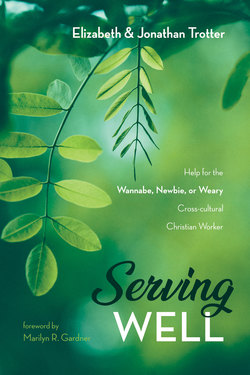Читать книгу Serving Well - Jonathan Trotter - Страница 8
На сайте Литреса книга снята с продажи.
Why Are We Here? An Important Question We Must Ask and Keep Asking
Оглавлениеby Jonathan
Why are we here? Why have we chosen lives that cause us to engage suffering in very raw ways? Visible ways? Why do we expose our hearts to people in pain? Why are you preparing for cross-cultural work? Why do we use our passports for more than an occasional vacation? Why do we live in places where we sweat more than we thought possible? Places where we get diseases we can’t even spell?
We say goodbyes. Our kids say goodbyes. And sometimes we say goodbye to our kids. Why?
• To give someone clean water?
• Access to healthcare?
• A chance at democracy?
• Education?
• Sustainable agriculture?
• Counseling?
• Economic viability?
• The Bible?
Yes, of course.
But there’s more, isn’t there? Those things, by themselves are good and right and worth doing, out of common decency and love for humanity. But on top of all that, and indeed overarching all those good things, is Jesus. He takes those good things and infuses them with something else entirely. Something holy, eternal, and altogether lovely.
The gospel compels us to love as we’ve been loved, and that’s something worth remembering. If our work gets separated from the Word, we’re in trouble. We must let our “roots grow down into him, and let [our] lives be built on him.” Then we’ll overflow with thankfulness, strong in truth (Col 2:7).
We must remain in him, refusing to forget the story of his immense love and our surprising salvation (John 15:5–8; Rom 5:8).
~~~~~~~~~~
Through our actions, our preachings, our service, we announce the news that God is not absent. We show and tell the redemption of all things.
~~~~~~~~~~
Why are we here? Because the story is bigger than suffering and pain and death. Because there is a glorious, mysterious hope that’s code-named Jesus. Why are we here? Because we are in awe of the love of God. The magnificent, sky-shattering love of God that tears time and dimensions to deliver a Son. Because there’s a Savior who was willing to bleed his heart out for the “bad guys.”
Like me.
And you.
The gospel is a time capsule from the future, announcing what will be; not what might be, or could be, but what will be, and in part is already.
It’s a saving which is available to all because of One. It’s redemption. It’s a Father who loves unendingly and perfectly, fully and wholeheartedly. It’s justice that won’t blow up in our faces (although that’s what we deserve) because it’s been disarmed, defused, and fully satisfied by a Lamb. The gospel is peace with God.
We echo a messenger from another time and place who said, “He is not here; he has risen, just as he said” (Matt 28:6 NIV). We say he lived, and he lives still: “But God released him from the horrors of death and raised him back to life, for death could not keep him in its grip” (Acts 2:24).
The gospel travels to “the land where death casts its shadow” and does what light does, revealing reality, removing fear: “[T]he people who sat in darkness have seen a great light. And for those who lived in the land where death casts its shadow, a light has shined. (Matt 4:16)
May we never forget the gospel.
Through our medicine and our activism, our education and our micro-finance, our preaching and our translation, our counseling and our parenting, may we preach his death and resurrection until he comes again.
May we preach the gospel of a poor man who purchased the world: “Who gave himself for us to redeem us from all wickedness and to purify for himself a people that are his very own, eager to do what is good” (Titus 2:14 NIV).
May we preach the gospel of a day-laborer who’s coming back for his bride. May we preach Jesus, the One who steals death’s sting: “And the last enemy to be destroyed is death” (1 Cor 15:26).
May we remember the truths penned by John Donne:
Death, be not proud, though some have called thee
Mighty and dreadful, for thou art not so;
For those whom thou think’st thou dost overthrow
die not, poor Death, nor yet canst thou kill me.
From rest and sleep, which but thy pictures be,
Much pleasure; then from thee much more must flow,
And soonest our best men with thee do go,
Rest of their bones, and soul’s delivery.
Thou art slave to fate, chance, kings, and desperate men,
And dost with poison, war, and sickness dwell,
And poppy or charms can make us sleep as well
And better than thy stroke; why swell’st thou then?
One short sleep past, we wake eternally
And death shall be no more; Death, thou shalt die.1
Death does not win; Jesus does, and “everyone who belongs to Christ will be given new life” (1 Cor 15:22).
So why are we here?
Because Jesus is here, proclaiming “that captives will be released, that the blind will see, that the oppressed will be set free, and that the time of the LORD’s favor has come” (Luke 4:18–19).
And that, my friends, is good news indeed.
1. Donne, “Death, Be Not Proud,” lines 1–14.
